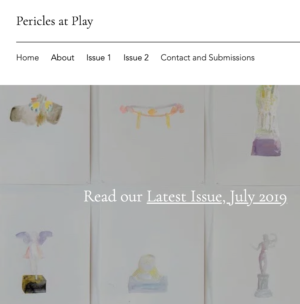by Tom Willis and Joshua Barley
Pericles at Play is a new, online, open access, magazine-style journal specialising in publishing and promoting contemporary literature that has a relation to classical reception, the ancient world, or its legacies. With the journal, we aim to bring excellent, new, exciting, ambitious, specially translated, and ultimately enjoyable literary fiction to readers. We publish with an eye to the broader reading public, promoting the classics beyond academia, but also want to provide a platform where modern literary classical receptions can be brought to the attention of academics working in the field.

The conception of Pericles at Play came in a flat in Athens situated on the southwest side of the city, just outside the ancient walls, built where we believed the site of the barathron lay, a pit where the condemned were thrown to die. On this macabre — and perhaps apocryphal — bedrock, late in the night, stimulated by flagons of krasí, modern Greek literature surrounding us stacked high on bookshelves, we discussed the scarcity of attention classical receptions receive in modern literary magazines and journals. As a young and earnest group of multinational classicists and archaeologists dazzled by living abroad, who wanted to experience the cutting edge of what the ancient could mean in literature today, we thought this was a shame, and set about plotting a remedy. ‘There is much that is festive in punishment,’ observed Nietzsche, and sitting above the barathron was always an excitement for thought.
The project was propelled when we won some money from the Department of Greek and Latin at University College London, which was swiftly spent on translating two exceptional pieces of modern Greek literature, short stories that deal with all that is most tantalising in literary classical receptions: nostos, nekyia, otherness, belonging, globalisation (ancient and modern), the oikos, the family, the state. They are representative of the current blossoming of the short story in contemporary Greek literature, which touches its heritage in ways direct and oblique. The pieces will pave the way for regular instalments of contemporary Greek short stories in the forthcoming issues.
Since then, we have collected stories and poems by classicists, translators, classically trained bomb-disposal and botanical experts, artists, and others, that deal with some of the diverse and complicated legacies of the ancient in the modern, the way it is ‘suffused into the fabric of modernity’ (Miriam Leonard, Athens in Paris, 146) and the way literature can give voice to the ‘silent fissuring’ of the ancient in the ‘configuration of the contemporary’ (Jacques Derrida, We Other Greeks, 21), bringing it out from its network of shadows.
The pieces range from the avant-garde to the classic short story to the memoiristic, and detail the experience of modern Greece as well as the ancient. We have created a collection that, we hope, is of interest to both the public and academia. The stories are beautiful as pieces of literature, but also of interest to anyone working on classical receptions, as they point to the ways in which the classics are still used to answer and ask questions today, questions that in some cases have stayed with us since they were first posed in the ancient world.
The journal will appear quarterly, with an ever-expanding scope, fitting in further experiments of form and content, and translating literatures that deal with the ancient world, especially in cultures that have traditionally been given less attention than Western and European ones.
For future issues, we encourage academics to send in writing about their experiences working and reading in classics, ancient history, archaeology, philosophy, etc., and/or travelling among ancient ruins. We believe that there is a great pool of unwritten experience in our field which would be of interest to both a specialist and public audience, and we would like to provide a platform for such writing.
The first issue of Pericles at Play is out now, and is available online at https://www.periclesatplay.com.
Contact: uclctew@ucl.ac.uk
Featured image by Annabel Dover: http://www.annabeldover.com

